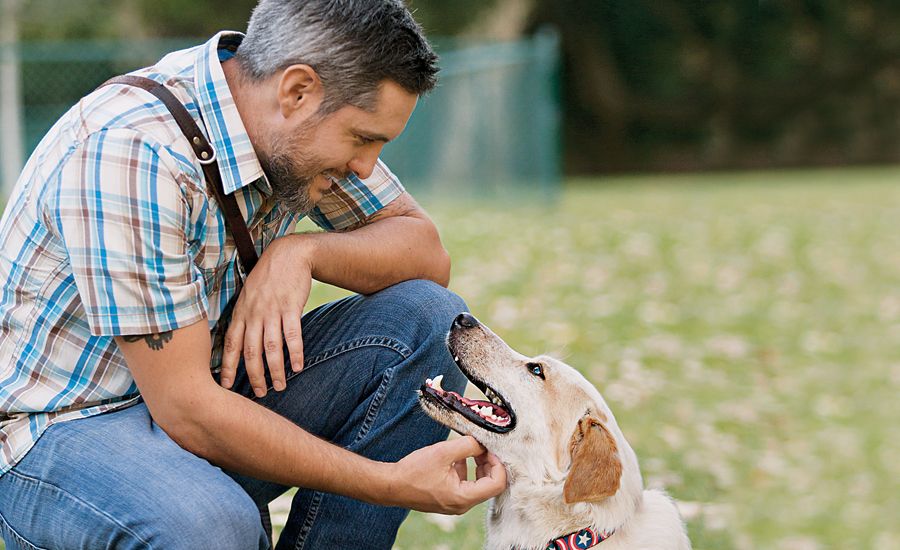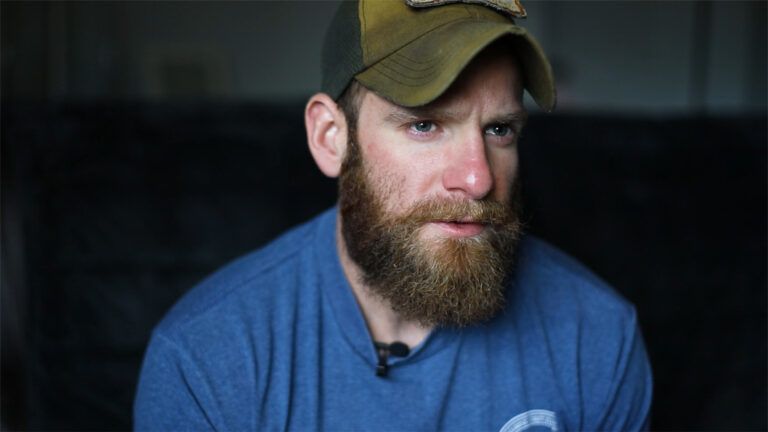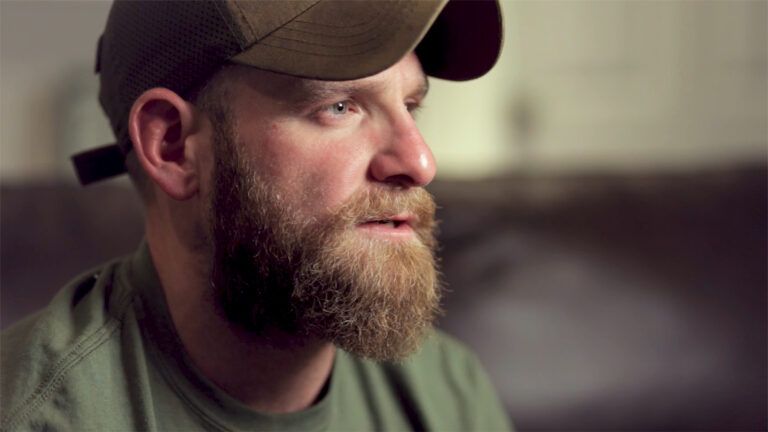There are probably thousands of veterans who have a story like mine: Enlisted in the Army. Got deployed. Saw combat. Got blasted by an IED.
I signed up at age 20 and trained as a combat medic because my dad had been one. The day my squad got hit in Iraq in 2005, our crew, in a Humvee, was okay. But I wasn’t able to save the driver of the car across the road. The guilt ate at me.
Voices in my head taunted me by day. You’re worthless. Kill yourself. Nightmares haunted my sleep. I talked to the chaplain but still felt guilty, not just about the guys I couldn’t save, but that I was struggling while buddies with more severe injuries were sucking it up and soldiering on.
Subscribe to Guideposts’ New Inspiring Pets Magazine ‘All Creatures’!
Was there something so wrong with me that God couldn’t—or wouldn’t—help? I turned to alcohol to numb the pain. When I was drunk I would shout at God. In 2009, I was diagnosed with PTSD. I tried everything the Army offered—counseling, detox, exposure therapy.
“Addiction is a disease of relapse, made much worse by PTSD,” my doctor warned me. He was right. I’d get well, then relapse, get well, then relapse. Finally an entire team was assembled to help me—primary physician, neurologist, nurse, recreational therapist, occupational therapist, psychotherapist.
For two years I did great. I stayed sober, was in charge of a forward aid station at Fort Irwin. My wife, Becky, was my rock. We had a two-year-old daughter and Becky was pregnant with our second little girl. She was a great stepmom to my teenage son.
Becky was English and she’d gone home to England with our daughter to visit her family for the holidays. My son was with his mom. The longer they were gone, the lonelier I got. I tried to go Christmas shopping, but the second I walked into the mall, the crowds made me feel like spiders were crawling on my skin.
Then the flashbacks came. The voices. You’re nothing. Just end it. I bolted for the liquor store.
Back home, I paced the living room, clutching a crucifix with one hand, swigging from a bottle of rum with the other. “I’m tired of this, Lord!” I ranted. “I’ve helped so many people. Where is my help?”
I didn’t tell Becky. I didn’t want to ruin her time with her family. But how much longer could she put up with me? She and the kids deserved better. I hurled the crucifix across the room. It slammed into the wall. Good. I polished off the rum and passed out. Maybe this time I wouldn’t wake up.
My first marriage fell apart during my second deployment. I’d given up on love, but then I met Becky, in 2008. We married after only four months. I felt that God must care about me after all if he’d sent me Becky. But the suicidal thoughts and flashbacks returned all too soon. I was devastated.
I’d work the night shift in the urgent-care clinic at the hospital at Fort Jackson, then come home and knock back a case of beer. One night I passed out and elbowed Becky in the face. She’d had enough.
“Randy, I love you,” she said, “but if you’re serious about us you need help. Professional help.”
I didn’t want to lose Becky. I went to the base hospital. “I don’t know what’s wrong, but I can’t stop these thoughts. I can’t stop drinking,” I said. That’s when the doctor diagnosed me with PTSD. “You have to get the drinking under control first,” he said.
I went to detox for 21 days, then joined AA. It was harder than combat, but I pushed through. Then I was transferred to Fort Irwin, where units do simulated battlefield training. Explosions, people screaming. Not the best place for someone with combat PTSD. I went right back to drinking. You’ll never beat this, the voices in my head told me.
Becky stuck by me as I was sent to yet more treatment, this time at an inpatient facility. That’s where the team was assembled to help me put my life back together.
They had. I’d been fine. For two years. Till now. I woke up on the couch, the empty rum bottle digging into my side. “Lord, forgive me,” I cried. “I don’t blame you if you’ve given up on me. But if you’re still there, tell me what I’m supposed to do now. Please.”
My cell phone was on the table next to me. I called a therapist on my team. “I’m suicidal,” I told her. “And hung over. I can’t live like this anymore.”
Click here to donate gift subscriptions to Guideposts Military Subscription Program.
In addition to another detox, she had a new idea. “This might sound crazy, but there’s a program with dogs that I think can help you.” An organization called Paws’itive Teams ran a six-week program to help active-duty military with PTSD make the transition into the civilian world through canine therapy.
I loved dogs. But if God couldn’t help me, how could a dog? Then again, what did I have to lose?
Three days later I showed up at the Paws’itive Teams building. There were six of us and six handlers, each with a dog. I stood there, my heart racing, not knowing what to expect. “We’ll pair you with a dog at random,” the director said.
My gaze was drawn to one dog in particular—a golden retriever. As if she could sense me staring, she turned her head. Something passed between us, something I could swear was of the spirit. She made a beeline for me, her tail wagging wildly.
“Hey, there!” I said, scratching her head. She opened her mouth, grinning. A calm fell over me, a calm I hadn’t felt in a very long time. My heartbeat slowed. I caught myself smiling back.
“This is Ricochet. I’m Judy,” her handler said. “Looks like she picked you.”
Judy, Ricochet and I walked the grounds. Judy told me that Ricochet had been trained as a service dog, but was too fond of chasing birds to qualify. Turns out she had other talents. Excellent balance and, remarkably, the ability to surf.
Judy taught me different cues to use with Ricochet. I could have her stop suddenly, or position herself between me and something I found threatening, or even give me a kiss when my nerves started to go.
“Ricochet’s very intuitive,” Judy said. “She can sense panic attacks coming, detect changes in your body leading up to an episode even before you do. She learns what situations trigger you.” She was an awesome dog. But predicting a panic attack?
A few days later, Becky came home from England. I confessed everything. I even told her about Ricochet. “If you want to leave, I understand,” I said.
“We’ve gotten through this before and we will again,” Becky said.
“How can you be so sure?” I asked.
“I don’t know…but there’s something different about you now. Give this dog thing a chance, maybe?”
The next week I went with Judy and Ricochet to a big box store for an exercise on how to control my PTSD in public spaces. Just like when I went to the mall, I froze. Way too many people. But Ricochet glanced back at me, then moved confidently forward as if to say, “Come with me, it’s safe.”
We walked into the store and down the main aisle. Suddenly, Ric stopped. Up ahead there was a cluster of people. It would’ve set off a panic attack for sure. Her stopping gave me a chance to assess my feelings and take a different aisle.
Detox cleaned the alcohol from my system, and Ricochet worked wonders on my underlying depression and anxiety. But when our six weeks were up, I worried. Would I relapse without Ric? I knew I would probably never see her again.
Becky had other ideas. “I called Judy,” she told me. “I told her how happy Ric makes you. She said you can see her anytime you want.”
A few weeks later we met in the parking lot of a church. Ricochet lay on her back in my lap. I scratched her belly while Judy asked me what it was like living with PTSD, so she could use the information to help others. When I got stressed and stopped scratching, Ric would lift my hands with her nose to get me to continue.
I’d never talked that openly about my PTSD. I felt like a huge burden had been lifted. The next time we met up, I went surfing with Ric, something I’ll never forget. Hanging ten with a golden retriever!
Judy offered to give Ricochet to me, but I knew Ric had a broader mission to help others. Thanks to Judy’s fundraising, though, I was able to get a service dog of my own—a Lab mix named Captain.
He is so in tune with me. He burrows his body into mine when I get anxious, wakes me from nightmares, and keeps a safe distance between me and situations that trigger my PTSD.
Captain goes everywhere I go—to the park with Becky and the kids, to the stables where we keep our horses, even to my college classes. I’m medically retired from the Army and am now studying communications, English and Spanish with the intention of reaching out to others with PTSD, of being not just a wounded warrior but a wounded healer.
All I have to do is look into Captain’s eyes or feel him nudging me forward when I need it and I’m reminded that even when we are shouting at God, he loves us unconditionally. He never stops trying, sending us hope and healing. Sometimes, if we’re lucky, it comes on four paws. Unconditionally.
Keep up with the latest from Ricochet on Facebook and Twitter.







